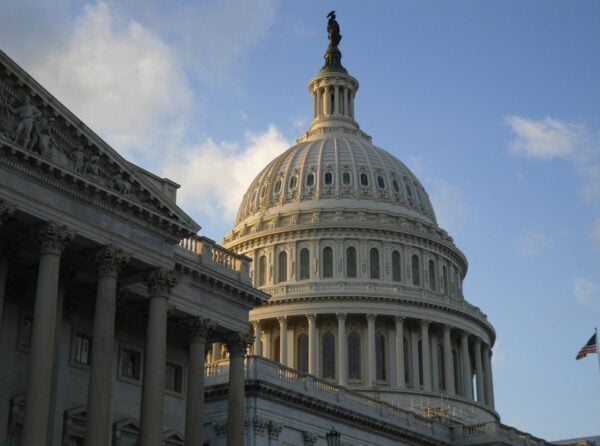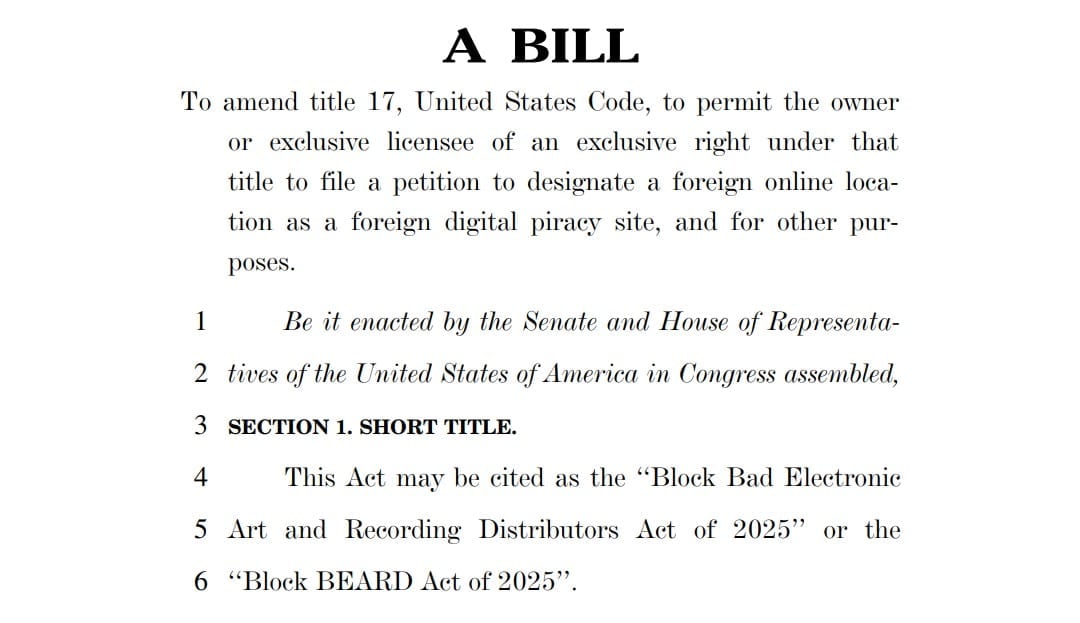 After a decade of focusing efforts overseas, the push for website blocking has landed back on American shores.
After a decade of focusing efforts overseas, the push for website blocking has landed back on American shores.
Earlier this year, U.S. Rep. Zoe Lofgren introduced a new pirate site blocking bill, titled the Foreign Anti-Digital Piracy Act (FADPA).
This week, a similar proposal was introduced by Senators Tillis, Coons, Blackburn, and Schiff. The bipartisan bill, titled Block Bad Electronic Art and Recording Distributors (Block BEARD), aims to introduce a legal mechanism for rightsholders to request site blocking orders.
Block BEARD
The site-blocking proposal seeks to amend U.S. copyright law, enabling rightsholders to request federal courts to designate online locations as a “foreign digital piracy site”. If that succeeds, courts can subsequently order U.S. service providers to block access to these sites.

Pirate site designation would be dependent on rightsholders showing that they are harmed by a site’s activities, that reasonable efforts had been made to notify the site’s operator, and that a reasonable investigation confirms the operator is not located within the United States.
Additionally, rightsholders must show that the site is primarily designed for piracy, has limited commercial purpose, or is intentionally marketed by its operator to promote copyright-infringing activities.
If the court classifies a website as a foreign pirate site, rightsholders can go back to court to request a blocking order. At this stage, the court will determine whether it is technically and practically feasible for ISPs to block the site, and consider any potential harm to the public interest.
The granted orders would stay in place for a year with the option to extend if necessary. If blocked sites switch to new locations, the court can also amend blocking orders to include new IP addresses and domain names.
Blocking Through Service Providers
The Block BEARD bill broadly applies to service providers as defined in section 512(k)(1)(A) of the DMCA. This is a broad definition that applies to residential ISPs, but also to search engines, social media platforms, and DNS resolvers.
Service providers with fewer than 50,000 subscribers are explicitly excluded, and the same applies to venues such as coffee shops, libraries, and universities that offer internet access to visitors.
Unlike the FADPA bill introduced by Representative Lofgren earlier this year, the Senate bill does not specifically mention DNS resolvers. Block BEARD does not mention VPNs, but its broad definition of “service provider” could be interpreted to include them.
The proposal states that providers have the option to contest their inclusion in a blocking order. Once an order is issued, they would have the freedom to choose their own blocking techniques. There are no transparency requirements mentioned in the bill, so if and how the public is informed is unclear.
Companion Bill with MPA and RIAA Support
The Senate’s Block BEARD bill is substantially similar to the House version, FADPA, and could be considered a companion bill. Since legislation has to pass both the House and the Senate, a combination of both proposals may ultimately lead to the final blocking legislation.
Commenting on the introduction, Senator Tillis hinted at this cooperation, mentioning that collaboration between the Senate and the House is already ongoing.
“I’m proud to lead this bipartisan discussion to protect our creative economy and digital security and I look forward to continuing to work with my colleagues in the House to address this important matter,” Sen. Tillis said.
Rightsholder groups have also responded positively to the bill. Mitch Glazier, CEO of the music industry’s RIAA, thanked the Senators for their efforts to protect consumers and rightsholders.
“Similar tools have been proven effective around the world over the last ten years with no harm to speech, Internet infrastructure or security, or participation online, and we strongly support this effort to create a simple, effective, judicial remedy with due process in the U.S,” Glazier said.
Motion Picture Association CEO Charles Rivkin is equally pleased.
“With bold leadership from Senators Tillis, Coons, Blackburn, and Schiff, the Block BEARD Act will equip our nation with a tool that’s worked in dozens of countries worldwide: a narrow, targeted means to fight the worst forms of foreign piracy while protecting free speech and the rule of law,” Rivkin said.
Notably, the press release did not include any comments from service providers. However, they are likely to chime in as the bill makes its way through the legislative process.
—
A copy of the “Block Bad Electronic Art and Recording Distributors Act of 2025” (Block BEARD) is available here (pdf)
From: TF, for the latest news on copyright battles, piracy and more.
Powered by WPeMatico
